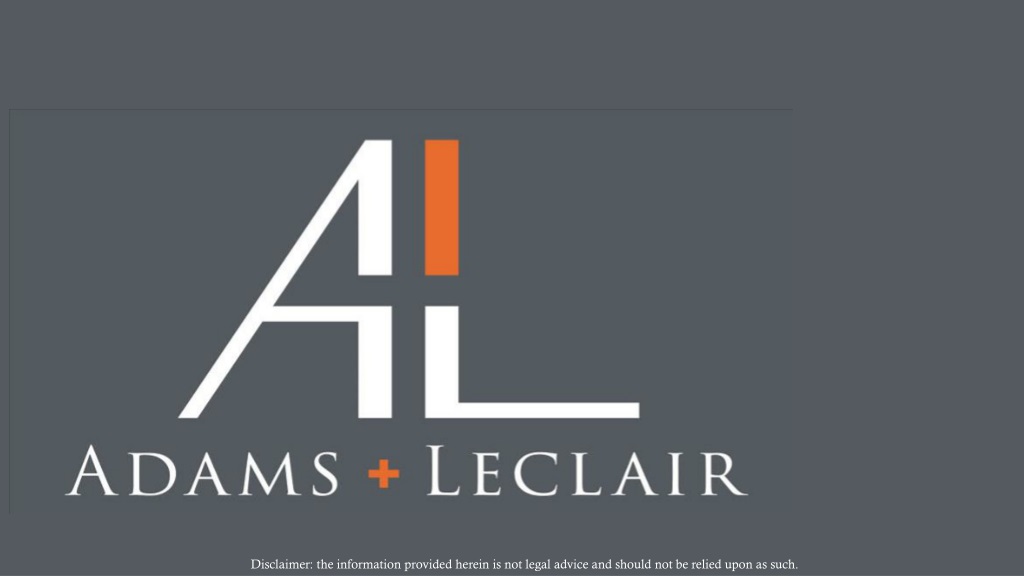

Replay
0 likes | 14 Views
Statutory requirements and key distinctions between Minority/Women-Owned Business Enterprises (M/WBE) and Disadvantaged Business Enterprises (DBE) in New York, recent developments in WBE certifications, the impact of a court decision on DBEs, trends in waiver requests for meeting diversity goals, consequences of noncompliance by contractors, and more.

E N D
Disclaimer: the information provided herein is not legal advice and should not be relied upon as such.
Minority and Women-Owned Business Entities in New York: What’s the latest? Richard T. Bell, Jr. Esq. Adams Leclair LLP 28 E Main St, Ste 1500 Rochester, NY 14614 rbell@adamsleclair.law 585.327.4100
Statutory Authority for M/WBE • Article 15-A Executive Law • Rules promulgated by 5 NYCRR 140-145 Key Requirements • at least 51% ownership by women/minority • minority or women must “Exercise authority to control and operate, independently, the day-to-day business decisions of the enterprise • Total net work less than $15 million (recently increased) • 300 employees or less • On state level the program is administered by Empire State Development MWBE directory: NY.NewNYContracts.com
Federal Disadvantage Business Enterprise Program (DBE) Authorized by sections in Federal Regulations: E.g., 49 CFR 26 for DOT projects • Utilized on federally funded project: NYSDOT • New York State Unified Certification Program (NYSUCP) is responsible for DBE certification in New York State • Includes portal to search for certified DBE companies. • There is no reciprocity with other States. DBEs must be certified by NYSUCP. DBE Directory: NYSUCP.NewNYContracts.com
Differences between DBE and MWBE • “Disadvantage” under DBE: in addition to women and minorities include individuals with social or economic disadvantage (E.g., person with disabilities). • M/WBE: In New York there are separate goals for women and minority businesses. Under DBE, there is only one stated goal for project. • Currently DBE participation goals are typically lower than New York State goals (plans underway to increase DBE goals in 2025).
Recent Court Decision Impacting DBEs Ultima Service Corp. v U.S. Dept. of Agriculture • District Court in Tennessee ruled that DBE program administered by Small Business Administration violated equal protection clause. • Use of “Rebuttable Presumption” that certain minority groups are disadvantaged violates the 5thamendment. • SBA is scrambling to address decision. Impact: Future challenges to women and minority policies and programs?
Latest Developments Regarding WBE Certifications in New York • WBE certifications in New York is good for five years (up from three) • Recently several long-standing WBE companies denied re- certification by the State. • Petition being circulated by Contractor’s Exchange of Buffalo and Western NY demanding that Empire State Development stop decertifying qualified WBE firms.
Case study: Prominent local WBE (100% woman owned) recently denied recertification despite over 25 years in business. Justification for denial: Business “has failed to demonstrate that the woman relied upon certification possesses adequate industry specific competence to make critical business decision without rely upon other persons.” Appeals process through the department of Economic Development Speculation on these denials by State.
What happens if MWBE is decertified while project ongoing? Distinction between revocation and denial of recertification. • Certification is revoked: The rules state there is a presumption of eligibility until appeal and final adjudication. (Appeal process can take months.) • No presumption in rules if MWBE recertification is denied.
• Written response to issue from Empire State Development: MWBE in appeals process retains all their rights until an adjudication is made. • Verbal statement from State Compliance Officer: Contractor gets credit for a decertified MWBE as long as the MWBE was certified on the date subcontract was executed. • Fair Warning: Individual agencies may follow different rules: E.g., Rochester City Joint School Construction Board’s practice requires replacement of a decertified MWBE.
Trends regarding M/WBE Waiver Requests Wavier: recourse if contractor believes it cannot meet goal requirements (can be submitted pre- or post-award). Process: Must demonstrate “Good Faith Efforts”: • Describe circumstances unique to contract that deferred meeting goals • Document solicitations to certified MWBEs and responses • Show advertisements seeking participants by MWBEs • Show steps taken to analyze scope of work to fund subcontractors’ opportunities for MWBE Past practice: pre-award waiver requests typically reviewed and responded to within 30 days. Recent Trend: delay in response to waivers of 60 days or more. Impact on project award and scheduling NYSDOT: has its own checklist for good faith efforts: Solicitation and Good Faith Efforts Guide.
Trends Regarding Noncompliance by Contractor • Withholding of payment. • Termination or cancellation of contract. • Suspension or debarment from future work. • NYDOT & OGS: utilize imposition of liquidated damages: difference between sums identified for payment to MWBE had contractor achieved its commitments and sums actually paid to MWBEs under contractor. • Use of False Claims Act against contractors.